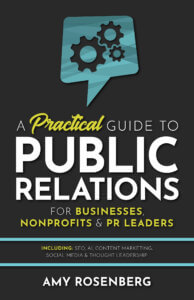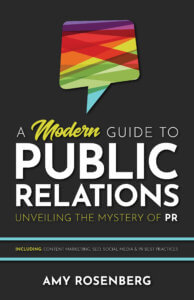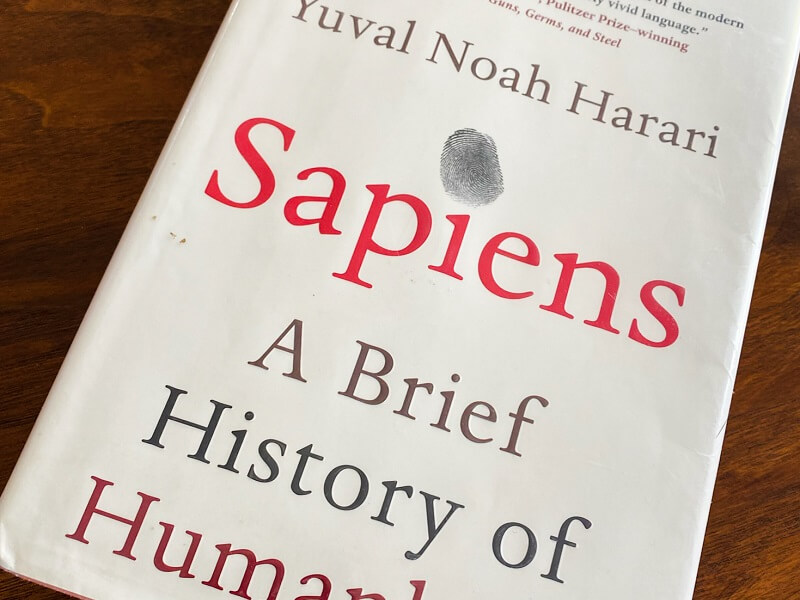
by Amy Rosenberg | May 5, 2022 | Amy Talk, Posts
My mind is currently being blown by Yuval Noah Harari’s “Sapiens: A Brief History of Humankind.” Learning about the history of our species — not “his”-tory, but the stages in which we’ve evolved — brings a new perspective to our way of working and living today.
For example, our constant worrying and work, work, working for the future comes from our agricultural roots, in which planning for the future was necessary for survival.
Yet, according to Harari, we were happier and healthier before the agricultural revolution, during our hunter-gatherer phase. Free to roam, we couldn’t plan ahead and made do with what we had. This forced us to stay in the present and exclusively connected us to the earth. We knew no other way.
However, the advent of agriculture caused us to stay put, creating a dependence on our small slice of land, along with the few staples it produced. We no longer roamed into new territories nor experiences, our genius chaining us for generations. A stagnant diet compromised our health and our harvesting methods created a manipulative, artificial connection to the earth.
Today as office workers, factory workers or caregivers, we are unable to shake our agricultural worrying. We’ve replaced anxieties about too little rainfall or too little sun with too little money or too little time. Immune to the luxuries that we’ve come to expect, we’re forced to work harder to maintain it all, causing more obligations and anxieties. This is a different type of chaining, similar to the land chaining we experienced in agricultural times.
I’m curious about what a hunter-gatherer lifestyle would look like today. Does it mean closing shop and moving wherever the seasons point? Is it living in the now to lessen the constant future-tripping? Or does it require shunning technology?
While these revolutionary thoughts may feel risky, possibly being chained to a job and a mortgage is the riskier option.
Maybe it doesn’t have to be all or nothing. If we adopt just a few new practices, we’ll be closer to our true selves, the way nature intended. I may start with the simple act of staying present and saying no to worrying about the future.
All this and I am not even halfway through the book.
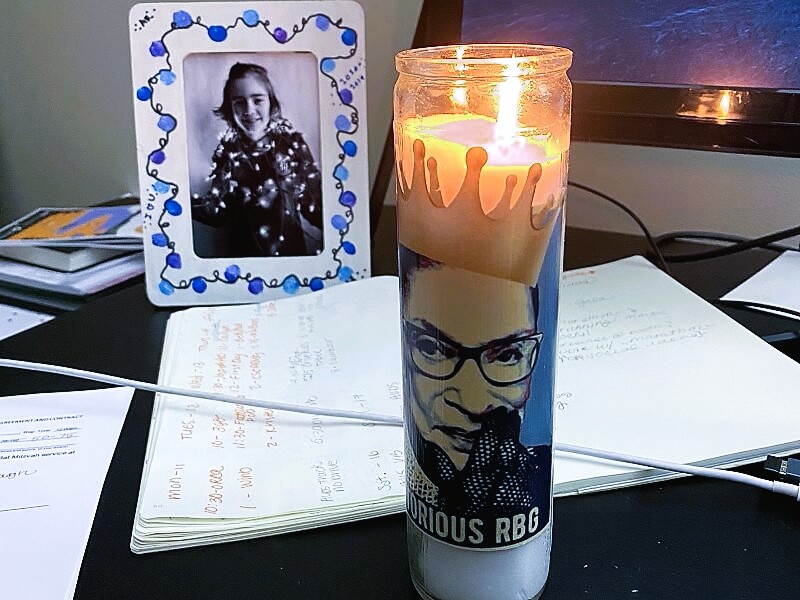
by Amy Rosenberg | Apr 21, 2022 | Agency Life, Amy Talk
I recently started bullet journaling in an attempt to appease my ADHD brain. But before I bore you with the details, know that the entire concept of bullet journaling was created by a creative agency worker. Ryder Caroll evolved the method to organize his tasks, notate client meetings and reserve room for brainstorming—all while at an agency.
My latest attempt at bullet journaling was a last resort caused by nearly missing one appointment and completely missing another. Of course these appointments were not work-related, showing you where my true priorities are. I am tempted to sneak in the notion that I am the perfect mother by indicating how these appointments were not related to my children. But then I’d be misrepresenting myself as one who has her family priorities completely aligned.
My brain literally cannot “see” digital calendars, especially when overlaying three additional family members’ calendars on top of mine. Yet, this missed appointment had nothing to do with other peoples’ calendars and I don’t have any technological excuses. The truth is that I will ignore anything that is not work-related, even if it is something I want to do, such as the facial I missed on a Friday at 5 p.m.
Realizing that something needed to change—since I’ve never completely missed an appointment—I turned to bullet journaling once again. My past attempts never worked because the practice has always been presented in elaborate, unapproachable ways.
Thinking that maybe this time I should learn from the actual creator of the method, I picked up Ryder’s book, the Bullet Journal Method, and it has been working for me. Imagine that! Since bullet journaling was born in an agency setting, by an agency worker, I thought you may appreciate three key concepts I have learned from Ryder.
Bullet Journaling Is Customizable
Bullet journaling has the reputation of being overly complicated and fussy, but it doesn’t have to be. Rather, bullet journaling can be whatever you want it to be. In fact, the concept of rapid logging—where you free-flow your to-do list, writing down items as they come to you without organization—seems to be the opposite of complicated and works really well for the ADHD brain whose thoughts can be all over the place. My to-do list is messy with the most mundane personal items mixed in with large brainstorms.
Bullet Journaling Removes Clutter
Then, if you’re so inclined, the organization comes later as the items are merged into other sections of the journal. Or not! Another key takeaway was relentlessly removing the unimportant tasks to free up time. If an item keeps appearing on various lists, does it mean I can’t get to it, or does it mean that it isn’t important and should therefore be removed altogether? Or, if one fails to show up for her facial, should it have been on her list at all?
Bullet Journaling Brings Calm
Ryder suggests starting and ending the day by bullet journaling, which has brought an unexpected sense of calm ritual to my working days. Before launching in, I’ll light the RBG candle I stole from my daughter, sip my double espresso and sketch out my day. While working, I’ll break from the screen to proudly check off a completed item. However, I’m not leaving enough time at the end of the day to assess where I’ve been and where I’ll go next within my bullet journal, likely because I am working on any old project up until the last minute. There is always room for growth!
Yet, I’m most happy that I’ve consistently bullet journaled for over a month. Afterall, Ryder suggests maintaining the practice for at least a few months, saying that it all clicks into place at the month’s end as you merge items and forward-plan.
As I sat down to close out last month and think forward to this month, a few click click clicks of the brain and the pen occurred and I understood what he meant. I can’t promise that I won’t miss a personal appointment, nor that I will bullet journal the way it is outlined in the book, but that is not the point. I’m free to refine my practice into something that will work for me. It’s not pretty, but it’s mine.

by Amy Rosenberg | Sep 11, 2017 | Amy Talk, General, Posts, Resources
I read every night, no matter what.
It doesn’t matter if it is a work of fiction, a business book, or a personal self-improvement compilation. The act of reading helps me fall asleep but it’s so much more.
On the deepest level a good book affects my dreams. My dream-thoughts are influenced and structured the way in which the writer structures their prose. I’m literally writing in my dreams—heavily copying my current read’s style, pulling out lines for press releases and emails in the most mundane sense but if I’m really lucky I’ll dream a line from out of nowhere in the early morning hours that could be used in a different sort of piece. If I’m even luckier, I’ll remember it. Twice the lines have jolted me awake and I had to write them down.
On a more fundamental level I believe that reading helps us become better writers. It is through reading that we learn how to structure a phrase, move to new ideas, deliver a quote. Since this is a business blog I will introduce a few of the business books that I’ve read but I can’t do that without mentioning the book I simply could not put down, finished last night.
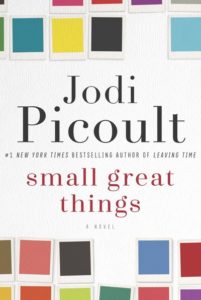 It was one of those books that I am happy to be done with because it was consuming my thoughts, affecting my sleep, not only because I couldn’t put it down but because when I did I was wondering what would happen next, upset about the injustice of it all.The book was “Small Great Things” by Jodi Picoult, said to be the most important novel she has ever written by the Washington Post. If you are a human living on this earth, you simply must read it. It explores racism in America through a fictional setting in which an African American nurse cares for the baby of white supremacists. What’s even more shocking than what happens next is getting a peek into the minds of each character, representing varying points-of-view in America, from the white supremacist to the middle class African American to the privileged white defense lawyer—who’s unrecognized, hidden racism is the most surprising of all. Something we need to examine deep within ourselves if we are also white and believe we are not racist.
It was one of those books that I am happy to be done with because it was consuming my thoughts, affecting my sleep, not only because I couldn’t put it down but because when I did I was wondering what would happen next, upset about the injustice of it all.The book was “Small Great Things” by Jodi Picoult, said to be the most important novel she has ever written by the Washington Post. If you are a human living on this earth, you simply must read it. It explores racism in America through a fictional setting in which an African American nurse cares for the baby of white supremacists. What’s even more shocking than what happens next is getting a peek into the minds of each character, representing varying points-of-view in America, from the white supremacist to the middle class African American to the privileged white defense lawyer—who’s unrecognized, hidden racism is the most surprising of all. Something we need to examine deep within ourselves if we are also white and believe we are not racist.
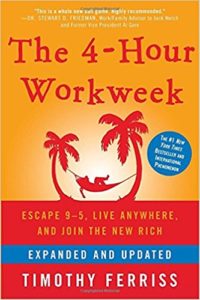 And on that uplifting note, I’m moving on to the business books. I am loving Tim Ferriss’ “The 4-Hour Workweek.” I purchased it on my iPad and devoured it, realizing I needed to hold it in my hands so I could dissect it further. So I bought it again in hardback and am writing notes in the margins.
And on that uplifting note, I’m moving on to the business books. I am loving Tim Ferriss’ “The 4-Hour Workweek.” I purchased it on my iPad and devoured it, realizing I needed to hold it in my hands so I could dissect it further. So I bought it again in hardback and am writing notes in the margins.
I’d already done half of the book’s suggestions years before reading it. And I mean that in the most elemental way. About 10 years ago I quit my desk job to work as a PR freelancer — grasping at the freedom Ferriss promises in his book. This grew into my company, Veracity.
While having my own business offers flexibly, I still must answer to bosses in the form of clients. This is where the more advanced part of Ferriss’ book comes in. His book is giving me the courage to move our business in a different direction—creating products we can sell in our sleep rather than offering services we manually fulfill. I’m currently following his book’s advice in launching a product which I’ve discovered is turning into a book about PR. Who says a book isn’t a product that you can sell in your sleep? Also to Ferriss’ point: the book brings credibility to any future products we might develop.
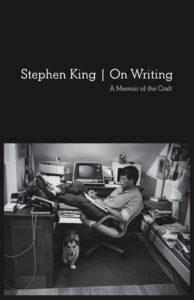
The product may have merged into a book when I started reading Stephen King’s “On Writing,” which could give business owners a different kind of courage. The courage to take seemingly hard business endeavors one day at a time, as King advises we write. The schedule I put myself on to build the product has inadvertently turned into a writing schedule (one of King’s tips).
Another key point in King’s book is to forgo book outlines to maintain creativity and flow. I think the same could go with building a business. We work on the business one day at a time. We don’t always need to embark on setting down a huge plan, which could be intimidating as you can overthink yourself out of great ideas. I’ve learned how to spend that precious time actually making things happen for my business rather than plotting and planning.
Featured image courtesy of Clem Onojeghuo







